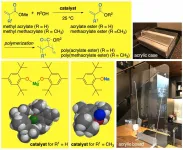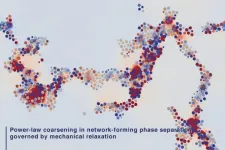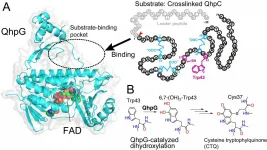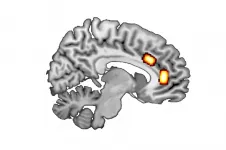Smectite promotes probiotic biofilm formation in gut for cancer immunotherapy
2021-02-10
(Press-News.org) Scientists from Nanjing University and the University of Macau have devised a new approach to extend the survival of transplanted probiotics in vivo, enhancing the efficacy of cancer chemo-/immunotherapies in mice. The paper entitled "Smectite promotes probiotic biofilm formation in the gut for cancer immunotherapy" appears online today in Cell Reports.
The gut contains trillions of symbiotic bacteria. Disturbing the balance of intestinal flora may increase the occurrence of major diseases, including cancers. The gut microbiome plays an essential role in regulating the host immunity, which has inspired strategies to modulate intestinal microorganisms for augmenting cancer chemo-/immunotherapy. Studies have shown that probiotics such as Lactobacillus and Bifidobacterium in intestinal flora can activate host immunity and sensitise tumour immunotherapy. Nevertheless, the two major approaches to change the gut microbiome's composition have met with substantial challenges: oral administration of probiotics is often inefficient, and faecal microbiota transplantation (FMT) risks pathogen infection. Therefore, scientists are looking for new and safe strategies to enrich probiotics in the host intestine.
The study found that Smectite, a drug commonly used for treating gastrointestinal diseases such as diarrhoea, could selectively promote the formation of lactic acid bacteria (LAB) biofilms, which foster LAB colonisation in the intestinal tract. The increase of probiotics in the intestinal tract induces anti-tumour immune responses, thereby inhibiting tumour growth and improving immunotherapy efficacy.
The researchers found that Smectite treatment increased Lactobacillus and Bifidobacterium in mice guts. Meanwhile, electron microscopy showed that only Lactobacillus and Bifidobacterium could form biofilms on the surface of Smectite, thanks to the latter's ion-exchanging microstructure. The researchers then demonstrated that oral Smectite exerted anti-tumour effects by altering the intestinal flora of mice. Moreover, considering the low number of beneficial bacteria in the gut, the researchers constructed smectite-lactobacillus-biofilm microspheres (SLB) in vitro. They fed the melanoma model mice with these microspheres, and the SLB showed a more significant anti-tumour effect than using Smectite or Lactobacillus alone.
The team further discovered a possible mechanism that SLB could stimulate dendritic cells' maturation (DCs) through the toll-like receptor 2 (TLR2) signalling. Meanwhile, the proliferation of CD8+T cells was stimulated, and the expression of IFN-γ and IL12 increased. Intriguingly, SLB drove the mature DCs from the colon to the tumour tissue and play the anti-tumour effect. Finally, the researchers further used the SLB in combination with chemotherapy and immunotherapy. In a mouse model, the combination of SLB with doxorubicin or anti- PD-1 antibodies showed better anti-tumour efficacy compared with using SLB, doxorubicin, or anti-PD-1 antibody alone.
This study provides an effective and safe strategy to promote probiotic colonisation and expansion in gut microbiota, via the specific support of Smectite for probiotic biofilm formation. The smectite-aided probiotic treatment was effective in activating the anti-tumour immune responses of DCs and cytotoxic T cells. According to the lead author, Prof Lei Dong, because Smectite has been clinical used for half a century in many countries - albeit, for another application - its safety data may be readily found to accelerate its translation for immunotherapy purpose. This gut microbiome-based, DC-activating therapeutic approach may have immediate translational potential for cancer immunotherapy.
INFORMATION:
[Attachments] See images for this press release:
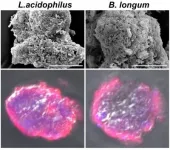
ELSE PRESS RELEASES FROM THIS DATE:
2021-02-10
Nagoya University scientists have developed a chemical reaction that produces high yields of a compound used in a wide variety of industries, without needing high temperatures or toxic catalysts. The approach was described in the journal ACS Catalysis and offers a practical and sustainable solution for industrial (meth)acrylate (= acrylate or methacrylate) ester synthesis.
(Meth)acrylate esters are used in industrial coatings and masonry, and to make plastics, dyes and adhesives. But the chemical process for making them from methyl (meth)acrylates ...
2021-02-10
As families settle back into a new school year, sleep experts at the University of South Australia are reminding parents about the importance of teenagers getting enough sleep, cautioning them that insufficient sleep can negatively affect their mental health.
In a new research paper, UniSA sleep experts Dr Alex Agostini and Dr Stephanie Centofanti confirm that sleep is intrinsically linked to mental health, but is commonly overlooked by health practitioners as a contributing factor.
Dr Agostini says it's imperative that parents and medical practitioners ...
2021-02-10
For all their importance as a breakthrough treatment, the cancer immunotherapies known as checkpoint inhibitors still only benefit a small minority of patients, perhaps 15 percent across different types of cancer. Moreover, doctors cannot accurately predict which of their patients will respond.
A new study finds that inherited genetic variation plays a role in who is likely to benefit from checkpoint inhibitors, which release the immune system's brakes so it can attack cancer. The study also points to potential new targets that could help even more patients unleash their immune system's natural power to fight ...
2021-02-10
DALLAS, Feb. 10, 2021 — Reducing the prevalence of obesity may prevent up to half of new Type 2 diabetes cases in the United States, according to new research published today in the Journal of the American Heart Association, an open access journal of the American Heart Association. Obesity is a major contributor to diabetes, and the new study suggests more tailored efforts are needed to reduce the incidence of obesity-related diabetes.
Type 2 diabetes is the most common form of diabetes, affecting more than 31 million Americans, according to the U.S. Centers ...
2021-02-10
Researchers at Uppsala University and the Swedish University of Agricultural Sciences have used new methods for DNA sequencing and annotation to build a new, and more complete, dog reference genome. This tool will serve as the foundation for a new era of research, helping scientists to better understand the link between DNA and disease, in dogs and in their human friends. The research is presented in the journal Communications Biology.
The dog has been aiding our understanding of the human genome since both genomes were released in the early 2000s. At that time, a comparison of both genomes, and two others, revealed that the human genome contained circa 20,000 genes, down ...
2021-02-10
Increased level of plasma cells linked to improved cancer survival
1,300 prostate tumor samples studied
Immunotherapy-based precision medicine clinical trials being developed
CHICAGO--- Black men die more often of prostate cancer yet, paradoxically, have greater survival benefits from immunotherapy treatment. A new Northwestern Medicine study discovered the reason appears to be an increase of a surprising type of immune cell in the tumor. The findings could lead to immune-based precision medicine treatment for men of all races with localized aggressive and advanced prostate cancer.
In the new study, Northwestern scientists showed tumors from Black men and men ...
2021-02-10
CHAMPAIGN, Ill. -- When modified using a process known as epoxidation, two naturally occurring lipids are converted into potent agents that target multiple cannabinoid receptors in neurons, interrupting pathways that promote pain and inflammation, researchers report. These modified compounds, called epo-NA5HT and epo-NADA, have much more powerful effects than the molecules from which they are derived, which also regulate pain and inflammation.
Reported in the journal Nature Communications, the study opens a new avenue of research in the effort to find alternatives to potentially addictive opioid pain killers, researchers say.
The ...
2021-02-10
Tokyo, Japan - Researchers from Institute of Industrial Science at The University of Tokyo investigated the mechanism of phase separation into the two phases with very different particle mobilities using computer simulations. They found that slow dynamics of complex connected networks control the rate of demixing, which can assist in the design of new functional porous materials, like lithium-ion batteries.
According to the old adage, oil and water don't mix. If you try to do it anyway, you will see the fascinating process of phase separation, in which the two immiscible liquids spontaneously "demix." In this case, the minority phase always forms droplets. Contrary to this, the researchers ...
2021-02-10
Osaka, Japan - Investigators from the Institute of Scientific and Industrial Research at Osaka University, together with Hiroshima Institute of Technology, have announced the discovery of a new protein that allows an organism to conduct an initial and essential step in converting amino acid residues on a crosslinked polypeptide into an enzyme cofactor. This research may lead to a better understanding of the biochemistry underlying catalysis in cells.
Every living cell is constantly pulsing with an array of biochemical reactions. The rates of these reactions are controlled by special proteins called enzymes, which catalyze specific processes that would otherwise take much longer. A number of enzymes require specialized molecules called "cofactors," which can help shuttle electrons ...
2021-02-10
As indicated by other studies, different parts of the brain are responsible for different types of decisions. A research team led by Luca Franziska Kaiser and Prof. Dr. Gerhard Jocham from the HHU working group 'Biological Psychology of Decision Making', and Dr. Theo Gruendler together with colleagues in Magdeburg analysed the balance of the messenger substances GABA and glutamate in two forms of decision-making. The background to the research was to find out how different concentrations of these substances influence the person making the decision.
On the one hand, the researchers looked at 'reward-based decisions', which involve maximising reward by selecting the better of two ...
LAST 30 PRESS RELEASES:
[Press-News.org] Smectite promotes probiotic biofilm formation in gut for cancer immunotherapy

